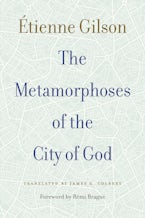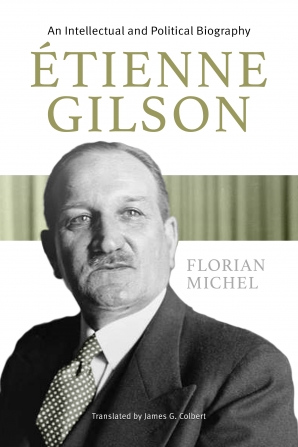- Home
- philosophy
- The Metamorphoses of the City of God
Preparing your PDF for download...
There was a problem with your download, please contact the server administrator.
The Metamorphoses of the City of God
Translated by James G. Colbert
Foreword by Remi Brague
Imprint: Catholic University of America Press
Étienne Gilson (1884-1978) was a French philosopher and historian of philosophy, as well as a scholar of medieval philosophy. In 1946 he attained the distinction of being elected an "Immortal" (member) of the Académie française. He was nominated for the Nobel Prize in Literature in 1959 and 1964.
The appearance of Gilson's Metamorphosis of the City of God, which were originally delivered as lectures at the University of Louvain, Belgium, in the Spring of 1952, coincided with the first steps toward what would become the European Union. The appearance of this English translation coincides with the upheaval of Brexit. Gilson traces the various attempts of thinkers through the centuries to describe Europe's soul and delimit its parts. The Scots, Catalonians, Flemings, and probably others may nod in agreement in Gilson's observation on how odd would be a Europe composed of the political entities that existed two and a half centuries ago. Those who think the European Union has lost its soul may not be comforted by the difficulty thinkers have had over the centuries in defining that soul. Indeed the difficulties that have thus far prevented integrating Turkey into the EU confirm Gilson's description of the conundrum involved even in distinguishing Europe's material components. And yet, the endeavor has succeeded, so that the problem of shared ideals remain inescapable. One wonders which of the thinkers in the succession studied by Gilson might grasp assent and illuminate the EU's path.
Étienne Gilson (1884-1978) was a French philosopher and historian of philosophy. Rémi Brague is a French historian of philosophy, specializing in the Arabic, Jewish, and Christian thought of the Middle Ages. James G. Colbert is professor emeritus of philosophy at Fitchburg State University, Mass.
"Gilson rounds up his reflections with a bold, albeit traditional, thesis, theological in nature: Grace does not abolish nature, but brings it to perfection (gratia non tollit naturam, sed perficit eam). This could be understood as meaning that grace builds upon the level of nature and adds a higher story to this foundation. Gilson interprets the formula as meaning that grace lifts up nature (another meaning of tollere!) to itself and enables it thereby to become what it had to be."
~from the foreword by Rémi Brague
"With his typically clear, penetrating intellect, Gilson envisioned the emerging European Union and the new global order by the light of Saint Augustine’s City. Unlike so many other mid-century Catholics, he did not fail to foresee that every attempt to parody the City of God results in the ruins of Babylon. Highly recommended."
~C.C. Pecknold, The Catholic University of America
"Everyone knows Étienne Gilson the Thomist and historian of medieval philosophy. Some know Gilson the connoisseur of modern art and wine. Few immediately think of Gilson the political philosopher. The master’s Metamorphoses of the City of God, written as Europe redefined itself in the wake of the Second World War, is a searching reflection on European identity, the history of church-state relations, and the role of the Christian in the modern nation state. Prescient in 1952, Gilson’s minor masterpiece now seems visionary. We owe James Colbert, the foremost translator of Gilson working today, an immense debt of gratitude for making it available to readers in English."
~Trent Pomplun, University of Notre Dame
"This wonderful and long-overdue translation of Gilson's venerable and formative Metamorphoses, from lectures he delivered in the early 1950s, provides us with a very important window onto a Europe that was then, like today, in great political, economic, social, cultural, and religious transition. James Colbert enriches us with his wondrous expertise, insight, and transformation of the text."
~Joshua Spero, Fitchburg State University
"Publication of this excellent translation of this masterpiece of wisdom by Gilson could not come at a more opportune moment. Anyone seriously interested in promoting global unity and world peace should buy it, read it, and discuss it in depth with others."
~Peter A. Redpath, Co-founder and President, International Étienne Gilson Society




